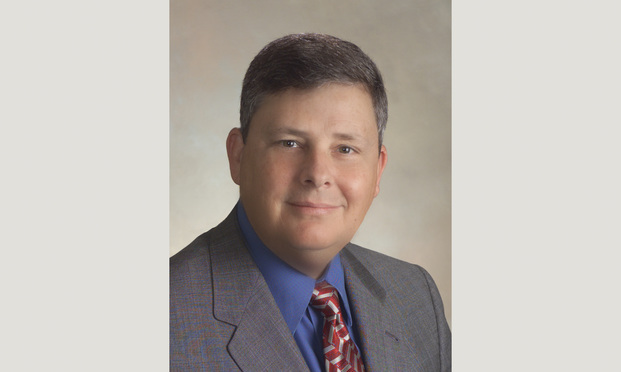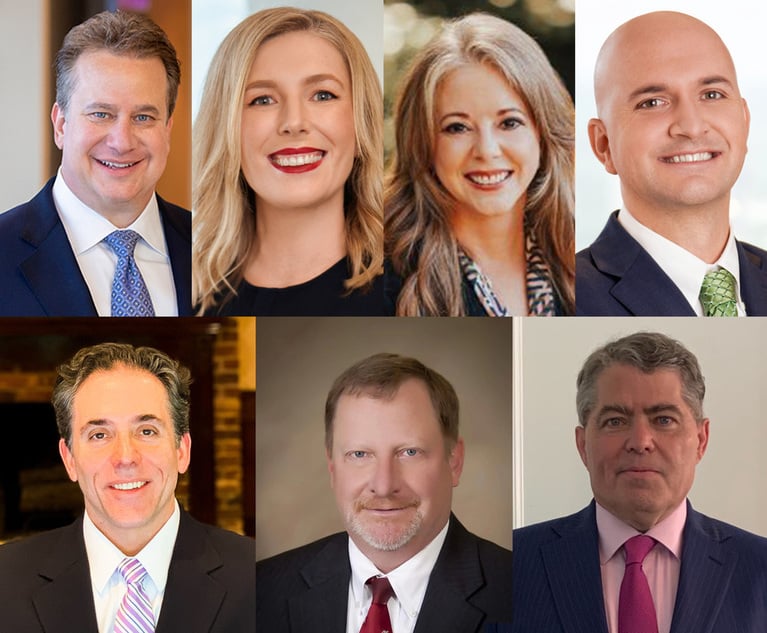Hit With $4.7M Verdict, Defunct Business Sues Insurer for Failing to Settle Within Its $1M Policy Limit
Game Truck Georgia, out of business after being hit with a $4.7 million personal injury verdict, said Atlantic Specialty Insurance nixed several opportunities to settle the claims against it within its $1 million policy limit.
February 19, 2020 at 03:19 PM
5 minute read
 Rich Dolder of Slappey & Sadd. (Courtesy photo)
Rich Dolder of Slappey & Sadd. (Courtesy photo)
Following last year's Cobb County verdict awarding more than $4.7 million to a student injured while playing "bubble soccer" as part of his high school soccer team's year-end party, fresh litigation filed in federal court claims the company's insurer acted in bad faith by failing to settle pretrial demands within its $1 million policy limit.
"This is a sad example of how an insurance company's refusal to settle harms Georgia businesses," said Rich Dolder of Slappey & Sadd, who filed the complaint with partner Jay Sadd on behalf of now-defunct Game Truck Georgia.
"The plaintiff's lawyers begged the insurance company to settle," said Dolder, but insurer Atlantic Specialty Insurance "insisted on a trial."
The hefty judgment contributed to the company's demise, he said.
"A Georgia business is gone and jobs lost because an insurance company decided to gamble rather than settle," Dolder said.
The attorney for Atlantic Specialty in the just-filed litigation, Seth Friedman of Lewis Brisbois Bisgaard & Smith, was unavailable for comment Wednesday.
The plaintiff in the underlying case, Salvador Reyes Quezada, was a Campbell High senior and a varsity soccer player when he was injured a few weeks before graduation in 2016.
Reyes incurred nearly $120,000 in medical bills from brain and skull injuries he suffered when he ran into another student and was knocked unconscious playing bubble soccer, in which players are covered with clear, inflated plastic bubbles from their heads to below their waists.
According to the complaint filed last week in the U.S. District Court for the Northern District of Georgia, Atlantic Specialty first turned down an offer to settle Reyes' claims for $750,000, then ignored a second demand for $1 million.
A few months before trial, the complaint said, Atlantic Specialty sent its insured, Game Truck, a letter warning that "there is a possibility that the claim asserted against you could exceed your available insurance limits" of $1 million.
Even so, the next day Atlantic Specialty sent Reyes' lawyers an offer to settle for $250,000.
Reyes refused, and last September a jury delivered a post-apportionment award that, including prejudgment interest, totaled more than $4.7 million.
In December, Cobb County State Court Judge Carl Bowers awarded an additional $176,000 in attorney fees and expenses to Reyes' trial team, Brad Thomas and Michael Goldberg of Fried Rogers Goldberg and Bill Curtis of Smyrna's William H. Curtis Law Office.
At trial, Game Truck was represented by Craig White of Skedsvold & White.
Atlantic Specialty posted an appellate bond of $1 million after the trial, the federal complaint said.
"Thus, Game Truck is exposed to the possibility that Reyes will seek to seize its game trailers and take other efforts to collect on that portion of the judgment that is not bonded," it said. "This possibility constitutes a real and immediate threat to Game Truck and its ability to resurrect its business and/or take other steps to mitigate its losses."
Atlantic Specialty "had multiple valid and reasonable opportunities to settle the claims against Game Truck within policy limits," said the complaint, which includes counts for bad faith failure to settle, attorney fees and punitive damages.
Goldberg, who is not involved in the new federal litigation, said the case illustrates the unreasonable pressures insurer decisions can place on plaintiff and defense lawyers.
"There has been a lot of press lately about 'nuclear verdicts.' I don't believe there are any such things," Goldberg said. "In every case with a large verdict, the plaintiff makes a reasonable demand that is rejected by the insurance company."
Forced to go to trial and try to keep the verdict low "puts the defense lawyer in an impossible situation where they are having to convince jurors of arguments that are the equivalent of saying the Earth is really flat."
"In our case, this is exactly what happened," said Goldberg. At trial, defense lawyer White "was forced to try and convince the jury that the defendant did nothing wrong" and keep the verdict below an offer that "was an insult for what Salvador suffered. The verdict recognized the true loss suffered by our client and was in the range where everyone evaluated the case."
This content has been archived. It is available through our partners, LexisNexis® and Bloomberg Law.
To view this content, please continue to their sites.
Not a Lexis Subscriber?
Subscribe Now
Not a Bloomberg Law Subscriber?
Subscribe Now
NOT FOR REPRINT
© 2025 ALM Global, LLC, All Rights Reserved. Request academic re-use from www.copyright.com. All other uses, submit a request to [email protected]. For more information visit Asset & Logo Licensing.
You Might Like
View All
Insurer Not Required to Cover $29M Wrongful Death Judgment, Appeals Court Rules

Trying to Reason With Hurricane Season: Mediating First Party Property Insurance Claims


'I Thank You': Attorney Leverages Daily Report Article to Turn $42K Offer Into $600K Settlement
7 minute readLaw Firms Mentioned
Trending Stories
- 1States Accuse Trump of Thwarting Court's Funding Restoration Order
- 2Microsoft Becomes Latest Tech Company to Face Claims of Stealing Marketing Commissions From Influencers
- 3Coral Gables Attorney Busted for Stalking Lawyer
- 4Trump's DOJ Delays Releasing Jan. 6 FBI Agents List Under Consent Order
- 5Securities Report Says That 2024 Settlements Passed a Total of $5.2B
Who Got The Work
J. Brugh Lower of Gibbons has entered an appearance for industrial equipment supplier Devco Corporation in a pending trademark infringement lawsuit. The suit, accusing the defendant of selling knock-off Graco products, was filed Dec. 18 in New Jersey District Court by Rivkin Radler on behalf of Graco Inc. and Graco Minnesota. The case, assigned to U.S. District Judge Zahid N. Quraishi, is 3:24-cv-11294, Graco Inc. et al v. Devco Corporation.
Who Got The Work
Rebecca Maller-Stein and Kent A. Yalowitz of Arnold & Porter Kaye Scholer have entered their appearances for Hanaco Venture Capital and its executives, Lior Prosor and David Frankel, in a pending securities lawsuit. The action, filed on Dec. 24 in New York Southern District Court by Zell, Aron & Co. on behalf of Goldeneye Advisors, accuses the defendants of negligently and fraudulently managing the plaintiff's $1 million investment. The case, assigned to U.S. District Judge Vernon S. Broderick, is 1:24-cv-09918, Goldeneye Advisors, LLC v. Hanaco Venture Capital, Ltd. et al.
Who Got The Work
Attorneys from A&O Shearman has stepped in as defense counsel for Toronto-Dominion Bank and other defendants in a pending securities class action. The suit, filed Dec. 11 in New York Southern District Court by Bleichmar Fonti & Auld, accuses the defendants of concealing the bank's 'pervasive' deficiencies in regards to its compliance with the Bank Secrecy Act and the quality of its anti-money laundering controls. The case, assigned to U.S. District Judge Arun Subramanian, is 1:24-cv-09445, Gonzalez v. The Toronto-Dominion Bank et al.
Who Got The Work
Crown Castle International, a Pennsylvania company providing shared communications infrastructure, has turned to Luke D. Wolf of Gordon Rees Scully Mansukhani to fend off a pending breach-of-contract lawsuit. The court action, filed Nov. 25 in Michigan Eastern District Court by Hooper Hathaway PC on behalf of The Town Residences LLC, accuses Crown Castle of failing to transfer approximately $30,000 in utility payments from T-Mobile in breach of a roof-top lease and assignment agreement. The case, assigned to U.S. District Judge Susan K. Declercq, is 2:24-cv-13131, The Town Residences LLC v. T-Mobile US, Inc. et al.
Who Got The Work
Wilfred P. Coronato and Daniel M. Schwartz of McCarter & English have stepped in as defense counsel to Electrolux Home Products Inc. in a pending product liability lawsuit. The court action, filed Nov. 26 in New York Eastern District Court by Poulos Lopiccolo PC and Nagel Rice LLP on behalf of David Stern, alleges that the defendant's refrigerators’ drawers and shelving repeatedly break and fall apart within months after purchase. The case, assigned to U.S. District Judge Joan M. Azrack, is 2:24-cv-08204, Stern v. Electrolux Home Products, Inc.
Featured Firms
Law Offices of Gary Martin Hays & Associates, P.C.
(470) 294-1674
Law Offices of Mark E. Salomone
(857) 444-6468
Smith & Hassler
(713) 739-1250






